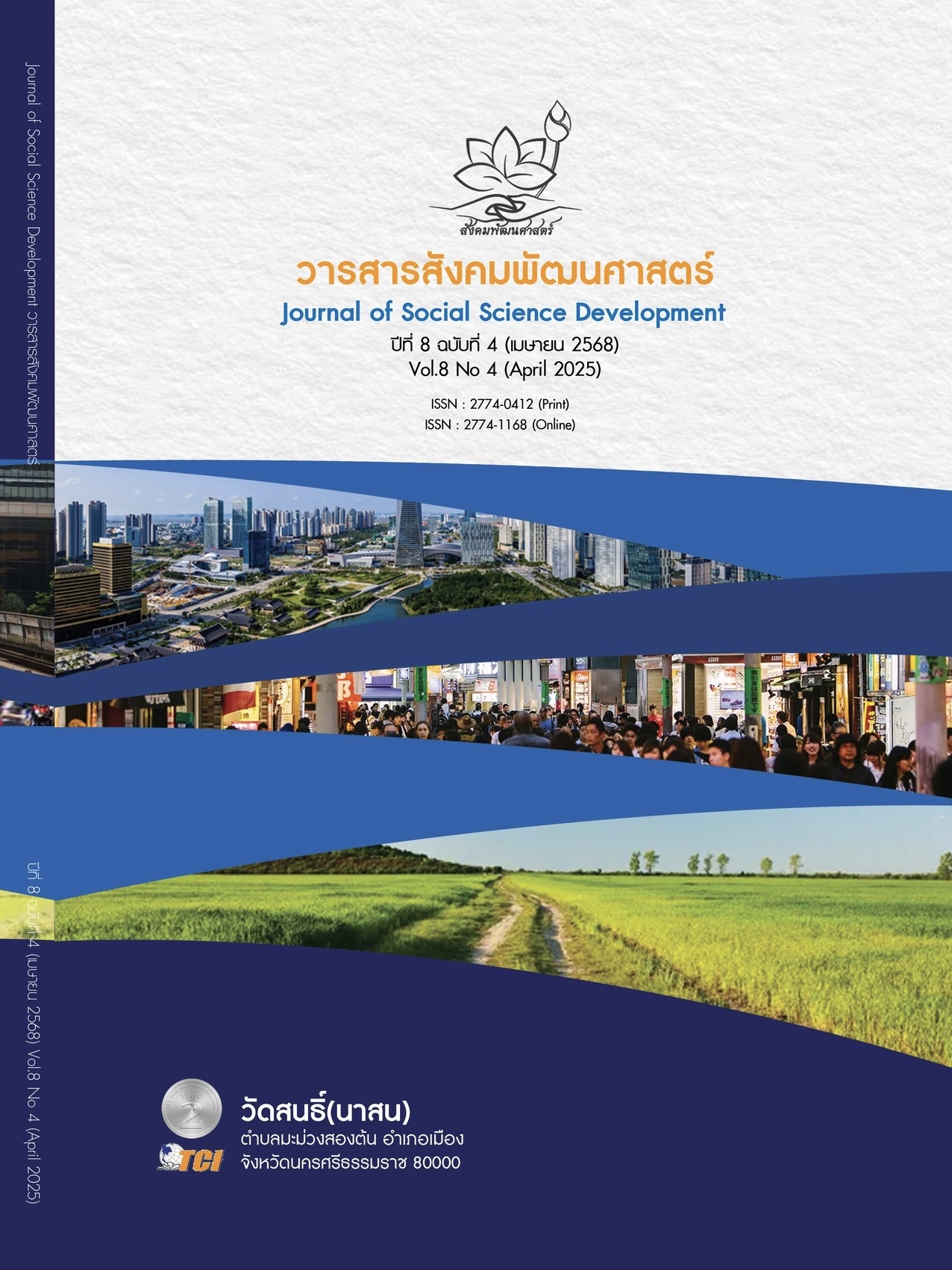THE DEVELOPMENT OF SELF-ESTEEM USING A SELF-ESTEEM ENHANCEMENT PROGRAM COMBINED WITH GROUP COUNSELING FOR MATHAYOM 2 STUDENTS AT WATTHASAI (DITTHANUKROH)
Main Article Content
Abstract
This research aims to compare the self-esteem levels of students before and after participating in a self-esteem enhancement program combined with group counseling. Additionally, it seeks to investigate students' satisfaction levels with the self-esteem enhancement program integrated with group counseling. This study employs a quasi-experimental design with a target group of three Mathayom Suksa 2 (Grade 8) students from Watthasai (Ditthanukroh) School, second semester of the 2024 academic year, who exhibit in-class behaviors such as a lack of confidence in their ideas, devaluation of their thoughts, and a feeling of insignificance within the school. These students were specifically selected through purposive sampling based on teacher behavior observations. The research instruments include: 1) a self-esteem enhancement program combined with group counseling, which received an overall average suitability score of 4.90 from experts; 2) a 10-item self-esteem questionnaire with an overall Index of Item-Objective Congruence (IOC) of 0.87; and 3) a 10-item satisfaction questionnaire regarding participation in the self-esteem enhancement program with individual counseling, which had an overall IOC of 1.00. Data were collected using the self-esteem enhancement program with group counseling, the self-esteem questionnaire, and the satisfaction questionnaire. The statistical analyses employed were mean and standard deviation. The findings revealed that the self-esteem levels of the students after participating in the self-esteem enhancement program combined with group counseling were significantly higher than before the program. Furthermore, the target group expressed the highest level of satisfaction with the self-esteem enhancement program integrated with group counseling.
Article Details

This work is licensed under a Creative Commons Attribution-NonCommercial-NoDerivatives 4.0 International License.
References
คณะจิตวิทยา จุฬาลงกรณ์มหาวิทยาลัย. (2559). Self-esteem–การเห็นคุณค่าในตนเอง. เรียกใช้เมื่อ 18 เมษายน 2568 จาก https://www.psy.chula.ac.th/th/feature-articles/self-esteem/
ฐาปน์ ตั้งจิตภักดีกุล. (2545). ปัจจัยที่สัมพันธ์กับการเห็นคุณค่าในเองและความรู้สึกสิ้นหวังในเด็กและเยาวชนที่กระทำผิดในสถานพินิจและคุ้มครองเด็กและเยาวชนกลาง. วารสารจิตวิทยาคลินิก, 33(1), 43-54.
ทินกร วงศ์ปการันย์ และณหทัย วงศ์ปการันย์. (2554). การวิเคราะห์องค์ประกอบเชิงยืนยันของแบบวัดความภาคภูมิใจในตนเองของโรเซนเบิร์ก: การศึกษาในนักศึกษาไทย. วารสารสมาคมจิตแพทย์แห่งประเทศไทย, 56(1), 59-70.
เทิดศักดิ์ เดชคง. (2567). แนวทางการให้คำปรึกษาสำหรับผู้ให้บริการสุขภาพปฐมภูมิ. (พิมพ์ครั้งที่ 1). กรุงเทพมหานคร: บริษัท บียอนด์พับลิสชิ่ง จำกัด.
พระมหาถาวรถาวโร. (2564). การให้คำปรึกษาแบบกลุ่ม. วารสารพุทธจิตวิทยา, 6(2), 61–68.
ภรภัค วงศ์อรุณ. (2564). ผลของโปรแกรมการให้คำปรึกษากลุ่มแบบผสมผสานที่มีต่อการเห็นคุณค่าในตนเองของนิสิตวิชาชีพ. ใน วิทยานิพนธ์ศิลปะศาสตรมหาบัณฑิต สาขาจิตวิทยาประยุกต์. มหาวิทยาลัยศรีนครินทรวิโรฒ.
เมธีณี คำบันลือ. (2564). ผลการใช้ชุดกิจกรรมแนะแนวเพื่อพัฒนาการเห็นคุณค่าในตนเองของนักเรียนชั้นมัธยมศึกษาปีที่ 3 โรงเรียนบ้านช่องแคบ จังหวัดตาก. ใน วิทยานิพนธ์ศึกษาศาสตรมหาบัณฑิต สาขาวิชาศึกษาศาสตร์. มหาวิทยาลัยสุโขทัยธรรมาธิราช.
ยูนิเซฟ. (2564). ยูนิเซฟและกรมสุขภาพจิตชี้โควิด-19 ส่งผลให้สุขภาพจิตเด็กและวัยรุ่นไทยย่ำแย่อย่างต่อเนื่อง. เรียกใช้เมื่อ 7 มกราคม 2568 จาก https://www.unicef.org/thailand/th/press-releases
หงษ์ฟ้า ธีรวงศ์นุกูล. (2556). การพัฒนาโปรแกรมเสริมสร้างการเห็นคุณค่าในตนเองและทักษะทางสังคมสำหรับนักศึกษาการศึกษานอกโรงเรียน. ใน ดุษฎีนิพนธ์ครุศาสตรดุษฎีบัณฑิต สาขาวิชาการศึกษานอกระบบโรงเรียน. จุฬาลงกรณ์มหาวิทยาลัย.
Coopersmith, S. (1981). The Antecedents of Self-Esteem. San Francisco: W.H. Freeman and Company.
Maslow, A. H. (1943). A theory of human motivation. Psychological Review, 50(4), 370-396.
Rosenberg, M. (1965). Society and the adolescent self-image. Princeton, NJ: Princeton University Press.


